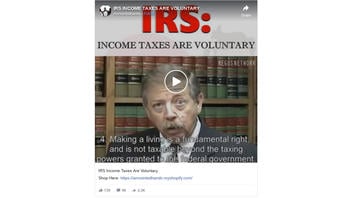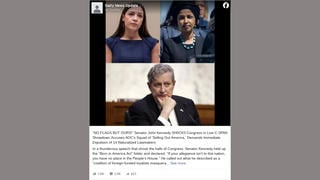
Are Internal Revenue Service (IRS) income taxes voluntary? No, that's not true: The duties to file a tax return and pay federal income taxes owed are not voluntary. The requirements are enshrined in the Internal Revenue Code as well as relevant case law.
The claim appeared in a Facebook post (archived here) published on March 27, 2021. The title of the post read: "IRS INCOME TAXES ARE VOLUNTARY." The post included video of various people talking about taxes. In one clip, an unidentified man said:
First, there is no law that makes the average American citizen liable for the income tax.
This is what the post looked like on Facebook at the time of writing:
(Source: Facebook screenshot taken on Mon Jul 26 15:48:30 2021 UTC)
His claim that income taxes are voluntary is not new. It's been around so long, and in so many different forms, that the IRS addresses it on its website. The federal taxation agency breaks down the claim into two parts. First, it addresses the contention that the filing of a tax return is voluntary. That's not true. Here's what the IRS says:
Some taxpayers assert that they are not required to file federal tax returns because the filing of a tax return is voluntary. Proponents of this contention point to the fact that the IRS tells taxpayers in the Form 1040 instruction book that the tax system is voluntary. Additionally, these taxpayers frequently quote Flora v. United States, 362 U.S. 145, 176 (1960), for the proposition that '[o]ur system of taxation is based upon voluntary assessment and payment, not upon distraint.'
The Law: The word 'voluntary,' as used in Flora and in IRS publications, refers to our system of allowing taxpayers initially to determine the correct amount of tax and complete the appropriate returns, rather than have the government determine tax for them from the outset. The requirement to file an income tax return is not voluntary and is clearly set forth in sections 6011(a), 6012(a), et seq., and 6072(a) of the Internal Revenue Code. See also Treas. Reg. § 1.6011-1(a).
Second, it addresses the contention that the payment of federal income tax is voluntary. That's also not true. Again, here's what the IRS says:
In a similar vein, some argue that they are not required to pay federal taxes because the payment of federal taxes is voluntary. Proponents of this position argue that our system of taxation is based upon voluntary assessment and payment. They frequently claim that there is no provision in the Internal Revenue Code or any other federal statute that requires them to pay or makes them liable for income taxes, and they demand that the IRS show them the law that imposes tax on their income. They argue that, until the IRS can prove to these taxpayers' satisfaction the existence and applicability of the income tax laws, they will not report or pay income taxes. These individuals or groups reflexively dismiss any attempt by the IRS to identify the laws, thereby continuing the cycle. The IRS discussed this frivolous position at length and warned taxpayers of the consequences of asserting it in Rev. Rul. 2007-20, 2007-1 C.B. 863 and in Notice 2010-33, 2010-17 I.R.B. 609.
The Law: The requirement to pay taxes is not voluntary. Section 1 of the Internal Revenue Code clearly imposes a tax on the taxable income of individuals, estates, and trusts, as determined by the tables set forth in that section. (Section 11 imposes a tax on corporations' taxable income.)
Furthermore, the obligation to pay tax is described in section 6151, which requires taxpayers to submit payment with their tax returns. Failure to pay taxes could subject the non-complying individual to criminal penalties, including fines and imprisonment, as well as civil penalties.
The revenue service cites a number of court cases that support its position. For example, in Wilcox v. Commissioner, the 9th U.S. Circuit Court of Appeals rejected the claim that the payment of taxes is voluntary and imposed a penalty, stating that "all of the contentions which Wilcox raises are frivolous or wholly without merit." Similarly, in United States v. Gerads, the 8th U.S. Circuit Court of Appeals imposed sanctions against taxpayers "for bringing this frivolous appeal based on discredited, tax-protester arguments."


















